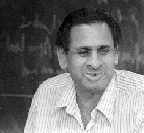 The recent solution of a conjecture made 40 years ago by a Purdue professor has brought acclaim not only
to those who solved the problem, but to Purdue's Mathematics Department as well.
The recent solution of a conjecture made 40 years ago by a Purdue professor has brought acclaim not only
to those who solved the problem, but to Purdue's Mathematics Department as well.
 The recent solution of a conjecture made 40 years ago by a Purdue professor has brought acclaim not only
to those who solved the problem, but to Purdue's Mathematics Department as well.
The recent solution of a conjecture made 40 years ago by a Purdue professor has brought acclaim not only
to those who solved the problem, but to Purdue's Mathematics Department as well.
David Harbater of the University of Pennsylvania and Michel Raynaud of the University of Paris received the Frank Nelson Cole Prize in Algebra at the January meeting of the American Mathematical Society in San Francisco. Considered one of the top prizes in the field of mathematics, the Cole Prize is awarded by the AMS every five years. Harbater and Raynaud were cited for their solution of a conjecture made by Purdue Professor Shreeram Abhyankar in his Harvard doctoral thesis, published in 1957 as "Coverings of Algebraic Curves." In his thesis, Abhyankar solved the problem of resolution of singularities of algebraic surfaces for nonzero characteristic and described what properties or characteristics Galois' group of equations would need to have in order for equations to be solved. (For more information about the mathematics, see A Layman's Perspective of Abhyankar's Conjecture.)
Abhyankar has been on the faculty of the Mathematics Department at Purdue since 1963 and in 1967 was named the Marshall Distinguished Professor of Mathematics. He is also interdisciplinary Professor of Industrial Engineering and Computer Science at Purdue. His research emphasizes constructive techniques and spans the areas of algebraic geometry, commutative algebra, local algebra, theory of functions of several complex variables, invariant theory, combinatorics, computer aided geometric design and robotics.
Abhyankar has received many awards for his work, including Purdue's Herbert Newby McCoy Award for best contribution to science in 1973, the Lester R. Ford Prize of the Mathematical Association of America in 1977, and the Medal of Honor from the University of Valladolid (Spain) in 1990. He is a Fellow of the Indian National Science Academy and of the Indian Academy of Sciences.
In 1978, the Mathematical Association of America awarded Abhyankar the Chauvenet Prize for his article entitled "Historical Ramblings in Algebraic Geometry and Related Algebra" (American Mathematical Monthly, June 1976). In it, Abhyankar wrote that his father, a mathematics professor, introduced him to mathematics and Sanskrit poetry by teaching him portions of Bhaskaracharya's treatise on algebra (called Beejganita, circa 1150 A.D.). Two of Abhyankar's uncles were also deeply interested in mathematics and contributed to the cultivation of Abhyankar's love and respect for mathematics. Despite these early influences, however, Abhyankar did not as a child seriously think of becoming a mathematician.
"Until the end of my undergraduate education I assumed that math would be my hobby, and I would be making a living as a carpenter or a printer. It did not occur to me whether I could, or should, make a living as a mathematician doing math."After graduating from the Royal Institute of Science, Bombay, in 1951 with a degree in mathematics, Abhyankar left India to attend graduate school at Harvard, where he received an A.M. degree in 1952 and a Ph.D. in 1955 under the direction of the late Oscar Zariski. Prior to coming to Purdue in 1963, Abhyankar held visiting positions at Columbia, Cornell, Yale, Johns Hopkins, Princeton, and Harvard.